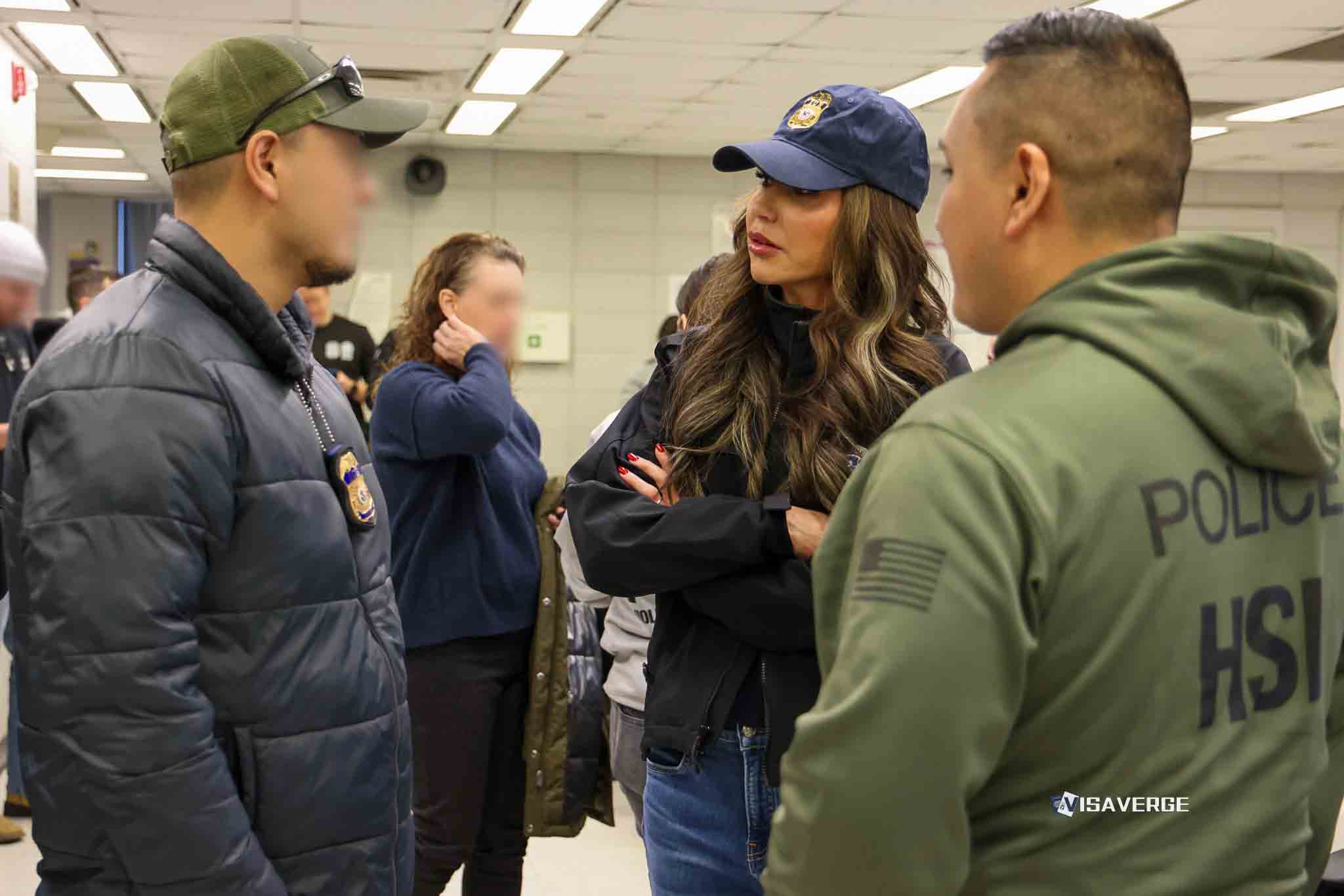Key Takeaways
• Since March 2025, ICE agents conduct unannounced visits to at least 30 unaccompanied minors in Minnesota.
• ICE’s initiative tracks minors’ welfare, court attendance, and potential exploitation with expanded sponsor background checks.
• Legal aid for unaccompanied minors was restored April 1, 2025, after a temporary suspension in March 2025.
Unaccompanied Minors in Minnesota Face Unannounced ICE Visits: What Families Need to Know
Unaccompanied minors living in Minnesota are now facing a new wave of unannounced visits from U.S. Immigration and Customs Enforcement (ICE) agents. These visits, which began to increase in March 2025, have caused fear and confusion among immigrant families, sponsors, and advocates across the state. The federal government calls these visits “wellness checks,” but many families and legal experts say the practice is unprecedented and deeply unsettling.

This article explains what is happening, why these ICE visits are taking place, how the process works, and what it means for unaccompanied minors, their sponsors, and the wider Minnesota community. It also provides practical steps and resources for those affected.
What’s Happening: The Surge in ICE Visits to Unaccompanied Minors
Since March 2025, there has been a sharp increase in unannounced ICE visits to homes where unaccompanied minors live in Minnesota. These visits have been reported in cities and towns such as Windom, Worthington, St. Paul, and Minneapolis. According to interviews and reports, at least 30 minors aged 9 to 16 in southern Minnesota have been interviewed by ICE agents in just a few weeks.
ICE agents arrive at the homes of these minors without warning, often in plain clothes and unmarked vehicles. They ask to speak with the minors and their sponsors, sometimes returning multiple times if the child is not home. The agents usually speak only English, which can make the situation even more stressful for families who do not speak the language well.
Why Are These ICE Visits Happening Now?
The increase in ICE visits is part of a new federal initiative launched under the Trump administration. On January 27, 2025, ICE issued a memo called the “Unaccompanied Alien Children Joint Initiative Field Implementation.” This memo directs ICE agents to find unaccompanied minors (often called UACs) who have been released from federal custody, check that they are following immigration rules, and look for signs of exploitation or trafficking.
The main goals of this initiative are:
– To locate unaccompanied minors released from federal custody
– To make sure minors are attending their immigration court hearings
– To check that minors are not being exploited or trafficked
– To investigate sponsors, especially those who are not blood relatives or who have not completed all required paperwork
ICE has also expanded background checks for all adults living in the same home as the minor, including fingerprinting and criminal history checks. The agency now has more access to the Office of Refugee Resettlement (ORR) database, which tracks children and their sponsors.
How the ICE “Wellness Checks” Work
The process for these ICE visits usually follows these steps:
- Identification: ICE identifies unaccompanied minors who have been released from federal custody, focusing on those who have missed court dates, are considered “flight risks,” or are living with non-blood relatives.
- Visit: ICE agents, often in plain clothes and unmarked vehicles, arrive at the minor’s home without warning.
- Interview: The agents ask to speak with the minor and the adults in the home. They may ask questions about the child’s well-being, school attendance, and immigration status. In many cases, the agents only speak English.
- Follow-up: If the minor is not home, agents may return several times.
- Outcome: Depending on what the agents find, the minor may be placed back in federal custody, the sponsor may be detained, or other enforcement actions may be taken.
These visits are not just a Minnesota issue. They are happening as part of a nationwide push to increase oversight of unaccompanied minors and their sponsors.
The Numbers: How Many Are Affected?
- At least 30 minors in southern Minnesota have been interviewed by ICE agents in recent weeks.
- Ages of minors interviewed: 9 to 16 years old.
- As of January 2025: 233,000 children nationwide had not been served with Notices to Appear (NTAs), which are official court summons for immigration hearings.
- 43,000 children who had received NTAs failed to show up for their immigration court hearings.
Minnesota continues to receive high numbers of unaccompanied minors released to sponsors, according to data from the Office of Refugee Resettlement.
What Are the Official Reasons for These Visits?
ICE and the Department of Homeland Security (DHS) say that the main reason for these “wellness checks” is to protect children from being exploited or trafficked. Federal officials point to recent cases where children were released to sponsors who were not properly vetted, leading to situations where minors were put at risk.
However, many advocates and attorneys argue that these visits are more about increasing deportations and making life harder for immigrant families. They say the visits are designed to scare families, discourage sponsors from coming forward, and push immigrants to leave the United States 🇺🇸.
How Are Families and Advocates Responding?
The response from families, advocates, and legal experts has been one of alarm and concern. Many families say they are afraid to answer the door or send their children to school, worried that ICE agents could show up at any time.
Erin Schutte Wadzinski, an immigration attorney in Worthington, says that the surprise visits are causing “significant fear” among families. She notes that this level of enforcement is new and did not happen under previous administrations.
Jessica Velasco from Unidos MN confirms that there has been a recent increase in surprise ICE visits in Worthington and Windom, with dozens of minors interviewed.
Karina Ramos from the Immigrant Defenders Law Center in Los Angeles warns that these tactics have a “chilling effect” on sponsors, especially those who are undocumented or living in mixed-status households (where some family members have legal status and others do not).
Jen Smyers, former chief of staff at the Office of Refugee Resettlement, criticizes the administration’s approach, saying it is meant to make life so difficult for immigrants that they either leave on their own or decide not to come to the United States 🇺🇸 at all.
What Are the Effects on Unaccompanied Minors and Their Sponsors?
The impact of these ICE visits is being felt in several ways:
For Unaccompanied Minors
- Fear and Confusion: Many minors are scared and do not understand why ICE agents are coming to their homes.
- Disrupted Lives: Some minors have been removed from their sponsors and placed back into federal custody. Others have been forced to leave the country with relatives who have been deported.
- Mistrust: The visits have created an atmosphere of mistrust between immigrant families and government agencies.
For Sponsors
- Increased Scrutiny: Sponsors now face more background checks, including fingerprinting and criminal history checks.
- Fear of Detention: Sponsors who are undocumented or have mixed-status families are afraid that coming forward could lead to their own detention or deportation.
- Fewer Willing Sponsors: The increased enforcement has discouraged many potential sponsors, especially non-blood relatives and undocumented individuals, from coming forward. This means more children may be left in government custody for longer periods.
For Legal Representation
In March 2025, a memo temporarily stopped legal representation for unaccompanied minors. However, a federal judge restored funding for legal help on April 1, 2025. This means that minors can once again get legal advice and support as they go through immigration proceedings.
The Policy Behind the Practice: How Did We Get Here?
The current wave of ICE visits is the result of several years of changing policies and growing concerns about the safety and whereabouts of unaccompanied minors.
- 2019–2023: Over 31,000 children released from federal custody had missing or incomplete addresses. By January 2025, 233,000 had not been served with court summons (NTAs).
- 2021–2024: There was a surge in unaccompanied minors crossing the border, leading to more focus on how sponsors are vetted and how children are tracked.
- 2025: The Trump administration renewed its focus on enforcement, leading to new ICE directives and more data-sharing between agencies.
The DHS Office of Inspector General has repeatedly found that ICE does not have enough resources or information to keep track of all unaccompanied minors. There are gaps in the data and problems with how cases are followed up.
What Does This Mean for the Future?
The situation is still changing. Here’s what to watch for in the coming months:
- Policy Changes: ICE and DHS are under pressure to improve how they share data, serve court summons, and monitor unaccompanied minors.
- Legal Challenges: Lawsuits and advocacy efforts are ongoing, challenging the legality and humanitarian impact of the current enforcement approach.
- Possible Expansion: The administration has signaled that it may continue or even expand these enforcement actions.
Advocates worry that continued enforcement will drive families underground, making it harder for children to get help and increasing the risk of exploitation.
What Should Families and Sponsors Do?
If you are a sponsor or family member of an unaccompanied minor in Minnesota, here are some steps you can take:
- Know Your Rights: You do not have to let ICE agents into your home unless they have a warrant signed by a judge. You have the right to remain silent and to ask for a lawyer.
- Prepare Your Family: Talk to your children about what to do if ICE agents come to the door. Make sure everyone knows not to open the door unless you are sure who is there.
- Seek Legal Help: If you or your child are contacted by ICE, contact an immigration attorney as soon as possible. Legal help is available, and funding for representation has been restored.
- Stay Informed: Keep up to date with changes in immigration policy and enforcement. Reliable information can help you make the best decisions for your family.
The Office of Refugee Resettlement (ORR) provides data on unaccompanied minors released by state and county, which can help families understand the scope of the issue in their area.
Resources for Unaccompanied Minors and Their Families
- ICE Public Affairs: (202) 732-4242
- DHS Office of Inspector General: (202) 981-6000, [email protected]
- Office of Refugee Resettlement (ORR): State and County Release Data
- Legal Resources: The Children’s Immigration Law Academy (CILA) provides Know Your Rights materials and legal resources for unaccompanied children and their advocates.
Multiple Perspectives: What Experts and Officials Say
- Federal Officials: Emphasize that the visits are about protecting children from trafficking and abuse. They point to recent cases where minors were released to sponsors who were not properly checked.
- Advocates and Attorneys: Argue that the visits are more about increasing deportations and scaring families. They warn that these actions may push families to avoid contact with authorities, making children more vulnerable.
- Oversight Bodies: The DHS Office of Inspector General has found that ICE does not have enough resources or good enough processes to keep track of all unaccompanied minors.
As reported by VisaVerge.com, the debate continues between those who see the visits as necessary for child safety and those who view them as harmful to immigrant families.
Conclusion: What Comes Next for Unaccompanied Minors in Minnesota?
The recent surge in unannounced ICE visits to unaccompanied minors in Minnesota has created a climate of fear and uncertainty. While federal officials say the goal is to protect children, many families and advocates believe the real aim is to increase deportations and discourage migration.
For unaccompanied minors and their sponsors, the most important steps are to know your rights, seek legal help, and stay informed about policy changes. The situation is likely to keep changing as legal challenges and advocacy efforts continue.
If you or someone you know is affected by these ICE visits, reach out to local legal aid organizations and use the resources listed above. Staying prepared and informed is the best way to protect your family during these uncertain times.
Learn Today
Unaccompanied Minors → Children under 18 living in the U.S. without parents or legal guardians present.
ICE → U.S. Immigration and Customs Enforcement, responsible for immigration enforcement and deportations.
Sponsors → Adults who care for minors released from custody and are responsible for their well-being.
Office of Refugee Resettlement (ORR) → Government office managing custody and placement of unaccompanied immigrant children.
Notice to Appear (NTA) → Official court summons requiring immigrants to attend immigration hearings.
This Article in a Nutshell
Minnesota faces new ICE visits to unaccompanied minors’ homes, sparking fear among families. This federal initiative checks minors’ well-being, immigration compliance, and sponsor safety amid rising enforcement and legal challenges.
— By VisaVerge.com








